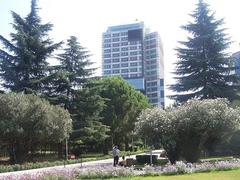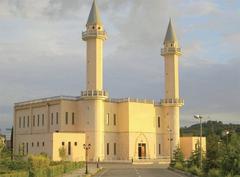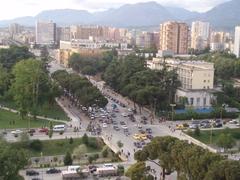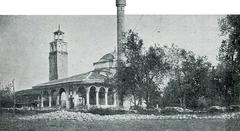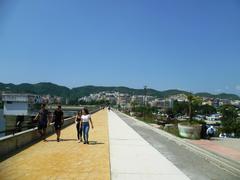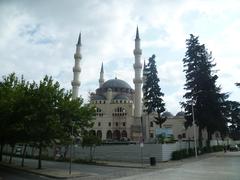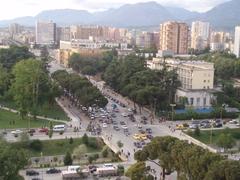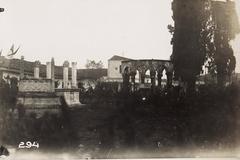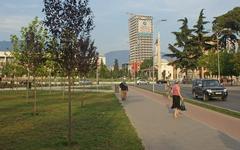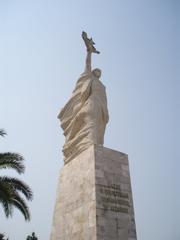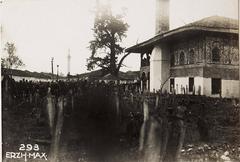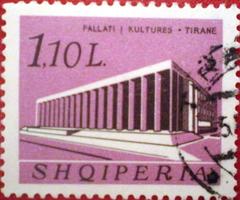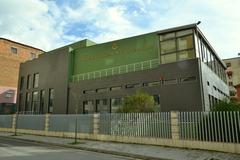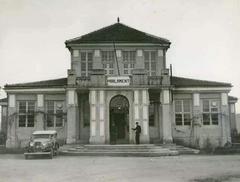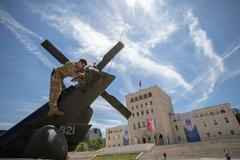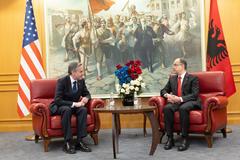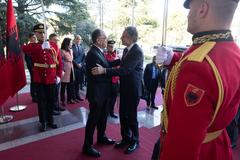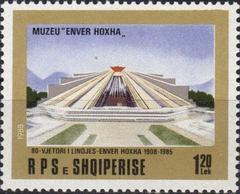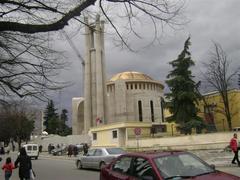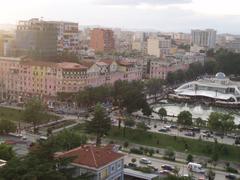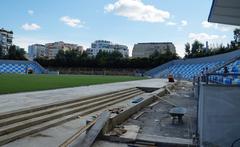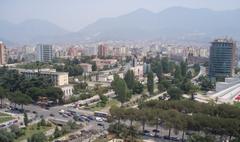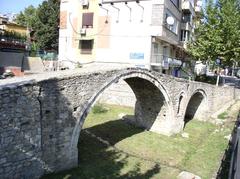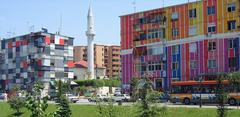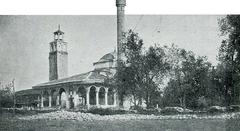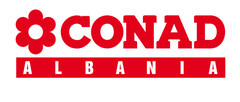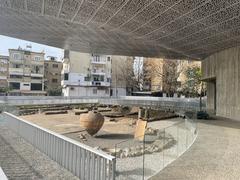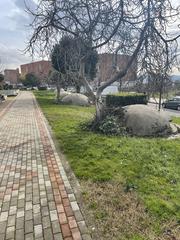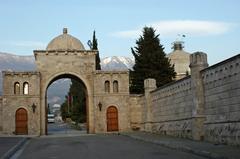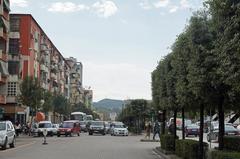University Hospital Shefqet Ndroqi Tirana: Visiting Hours, Tickets, and Visitor Information
Date: 15/06/2025
Introduction to University Hospital Shefqet Ndroqi in Tirana
University Hospital “Shefqet Ndroqi” is Albania’s premier institution for the diagnosis, treatment, and research of respiratory diseases. Established in the mid-20th century as a tuberculosis sanatorium, it has since evolved into a comprehensive center for pulmonary medicine, thoracic surgery, and broader healthcare services. Named after Dr. Shefqet Ndroqi, a pioneer in the fight against tuberculosis in Albania, the hospital not only delivers advanced medical care but also serves as a key teaching and research hub affiliated with the University of Medicine in Tirana. Its development reflects Albania’s broader progress in public health, particularly in reducing tuberculosis rates in line with World Health Organization (WHO) targets.
Strategically located on Fuat Bey Hill on the outskirts of Tirana, the hospital integrates modern medical technology—such as advanced CT scanners and digital X-rays—with compassionate, patient-centered care. Supported by partnerships with organizations like the United Nations Office for Project Services (UNOPS) and the Albanian Ministry of Health, the hospital has broadened its expertise to cover a wide spectrum of respiratory diseases, including COPD, asthma, lung cancer, and post-COVID-19 care. During the COVID-19 pandemic, it played a critical role by expanding intensive care and telemedicine services.
This guide offers essential information for patients, families, healthcare professionals, and international visitors regarding the hospital’s history, services, visiting protocols, cultural aspects, and practical tips. Whether you are seeking specialized care or planning a visit, this article provides detailed, reliable insights.
For more details, visit the hospital’s official website and these resources: (myhospitalnow.com, UNOPS, Shefqet Ndroqi Official Site).
Table of Contents
- Introduction
- Founding and Early Development
- Role in Albanian Healthcare System
- Expansion and Modernization
- Public Health Emergency Response
- Academic and Research Contributions
- Cultural and Social Impact
- Integration with National and International Health Initiatives
- Visiting Information for Patients and Families
- Practical Visitor Information and Cultural Considerations
- Frequently Asked Questions (FAQ)
- Conclusion
- Sources and Further Reading
Founding and Early Development
University Hospital “Shefqet Ndroqi” was established in the mid-20th century, initially as a sanatorium dedicated to combating tuberculosis—a pressing public health challenge in the Balkans at the time. Its location on the outskirts of Tirana was chosen for its clean air and isolation, ideal for TB treatment. Over time, the facility expanded into a comprehensive center for respiratory medicine, research, and education, and was named in honor of Dr. Shefqet Ndroqi, a pioneer in Albanian medical history (myhospitalnow.com).
Role in the Albanian Healthcare System
Affiliated with the University of Medicine in Tirana, Shefqet Ndroqi Hospital serves as Albania’s national reference center for respiratory diseases. It provides specialized care for conditions such as TB, COPD, asthma, and lung cancer, and plays a pivotal role in training medical professionals. The hospital’s work has been instrumental in reducing Albania’s TB incidence and shaping national health policies in line with WHO standards.
Expansion and Modernization
Recent modernization, supported by UNOPS and the Albanian Ministry of Health, has equipped the hospital with state-of-the-art diagnostic tools, including CT scanners and digital X-ray systems (UNOPS). With several hundred beds, the hospital includes dedicated wards for TB, general respiratory diseases, intensive care, and outpatient services. These upgrades ensure high-quality care and accurate diagnostics for a broad range of respiratory conditions.
Public Health Emergency Response
During the COVID-19 pandemic, Shefqet Ndroqi Hospital was at the forefront of Albania’s response. The hospital expanded its intensive care capacity, adapted treatment protocols, and collaborated internationally to secure critical medical supplies. Telemedicine services were also expanded to support remote consultations, particularly for vulnerable patients. These initiatives have strengthened Albania’s emergency preparedness for respiratory outbreaks (UNOPS).
Academic and Research Contributions
As a university-affiliated teaching hospital, Shefqet Ndroqi regularly hosts conferences, workshops, and training sessions for medical professionals. Research focuses on tuberculosis (including multidrug-resistant strains), lung cancer, and environmental lung diseases, often in collaboration with international partners. The hospital’s research findings inform national treatment guidelines and support evidence-based care across Albania (myhospitalnow.com).
Cultural and Social Impact
The hospital is a symbol of hope and resilience for many Albanians. Through community education and outreach programs, Shefqet Ndroqi Hospital works to reduce the stigma around TB and raise awareness about lung health. Partnerships with NGOs and international agencies amplify its public health impact.
Integration with National and International Health Initiatives
Shefqet Ndroqi Hospital collaborates with regional health centers and participates in international research networks, including those supported by the WHO and European Respiratory Society. These partnerships foster knowledge exchange and continuous service improvement (UNOPS).
Visiting Information for Patients and Families
Location and Access
- Address: Kodra e Fuat Beut, Tirana, Albania (Fuat Bey Hill, ~7 km southeast of Tirana city center)
- Phone: +355 688046405, +355 48855527
- Official Website: www.sushefqetndroqi.gov.al
The hospital is most accessible by car or taxi; public transportation is limited. Use Google Maps or local taxi apps for directions.
Visiting Hours and Admissions
- Visiting Hours: Typically from 10:00 AM to 12:00 PM, and 4:00 PM to 6:00 PM daily. Hours may vary by department and in special circumstances (e.g., infectious disease wards or intensive care units). Always confirm by contacting the hospital directly.
- Admissions: Emergency admissions are accepted 24/7. Planned admissions require prior referral and booking via the outpatient department.
Accessibility
The hospital is equipped to accommodate patients with mobility challenges, though some older buildings may have limited accessibility. Contact the hospital in advance to arrange assistance if needed.
Parking
On-site parking is available for visitors and patients, but it can be crowded during peak hours.
Practical Visitor Information and Cultural Considerations
Language and Communication
Albanian is the official language, but many younger staff speak English or Italian. Translation apps (like Google Translate) are helpful, and English-speaking personnel are often available.
Key Hospital Services
- Specialties: Pulmonology (including TB, COPD, asthma, lung cancer, post-COVID-19 care), Thoracic Surgery, Cardiology, Internal Medicine, Intensive Care, Laboratory Services (including the national TB reference lab), and Ambulatory Consultations.
- Pharmacy: An on-site pharmacy serves patient medication needs.
Entry, Health, and Emergency Protocols
- Visa Requirements: Most European nationals can enter Albania visa-free for up to 90 days; check requirements before travel.
- Health Insurance: Comprehensive travel insurance is recommended. Non-residents may need to pay for services.
- Vaccinations: No special vaccines required, but standard immunizations should be up to date.
- Emergency Numbers: Ambulance 127, Police 129, Fire 128.
Payment and Costs
- Currency: Albanian Lek (ALL). Cash is preferred; credit cards may not always be accepted.
- Hospital Fees: Foreign visitors may be charged; clarify costs during admission.
Food, Water, and Amenities
- Hospital canteens or cafés are available. Bringing snacks is advisable.
- Use bottled water for drinking.
- Public restrooms may lack supplies; bring tissues and sanitizer.
Safety and Security
Tirana is generally safe. Exercise standard precautions and keep valuables secure. Hospital grounds are monitored.
Connectivity
- Local SIM cards are affordable and offer good coverage.
- Hospital Wi-Fi may be available, but not guaranteed.
- Albania uses European plugs (Type C and F, 230V).
Local Transportation
- Taxis are common and reliable; use reputable services.
- Public transport to the hospital is limited.
- On-site parking is available, but may be crowded.
Public Holidays
Hospital operations may be limited on public holidays (e.g., New Year’s Day, Summer Day, Independence Day, Christmas Day). Plan visits accordingly.
Cultural Etiquette
Albanian culture values hospitality. Within the hospital, modest dress and quiet behavior are expected. Photography is generally prohibited without permission. Learning simple Albanian phrases is appreciated:
- Miredita (Good day)
- Faleminderit (Thank you)
- Po (Yes)
- Jo (No)
Frequently Asked Questions (FAQ)
Q: Are international patients accepted?
A: Yes. Contact the hospital’s international patient office for assistance.
Q: Are visitors allowed during the COVID-19 pandemic?
A: Policies may change due to health regulations; check the website or call ahead.
Q: What respiratory specialties are covered?
A: The hospital treats TB, COPD, asthma, lung cancer, and other respiratory conditions.
Q: Is there an on-site pharmacy?
A: Yes, for patients’ medication needs.
Q: Are there fees for foreign visitors?
A: Yes, clarify costs during admission.
Q: Is the hospital accessible for people with disabilities?
A: Main entrances are accessible; some older areas may not be. Contact the hospital in advance.
Conclusion
University Hospital Shefqet Ndroqi is a cornerstone of respiratory healthcare in Albania, blending decades of medical advancement and research with a patient-focused approach. The hospital’s integration into the national health system, ongoing modernization, and commitment to education and research make it a leading institution in the region. Whether you are a patient, family member, or healthcare professional, being informed about hospital services, visiting procedures, and cultural expectations ensures a positive experience.
For the latest information, always consult the hospital’s official website or contact them directly. Consider using mobile applications like Audiala for real-time updates and support.
Sources and Further Reading
- Visiting Shefqet Ndroqi Hospital in Tirana: History, Services, and Patient Information – MyHospitalNow
- Enhancing medical care in Albania – UNOPS
- Practical Visitor Information and Cultural Considerations for University Hospital Shefqet Ndroqi, Tirana – Official Hospital Website
